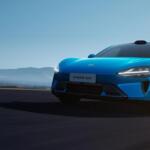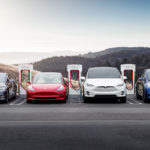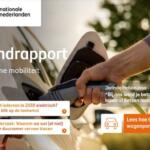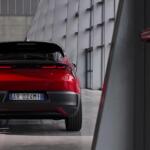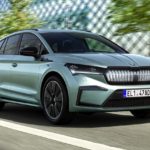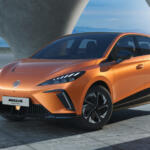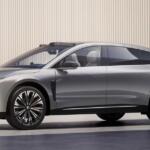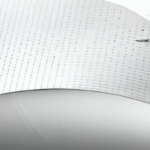Way to Zero: roadmap van Volkswagen voor klimaatneutrale mobiliteit
29. april 2021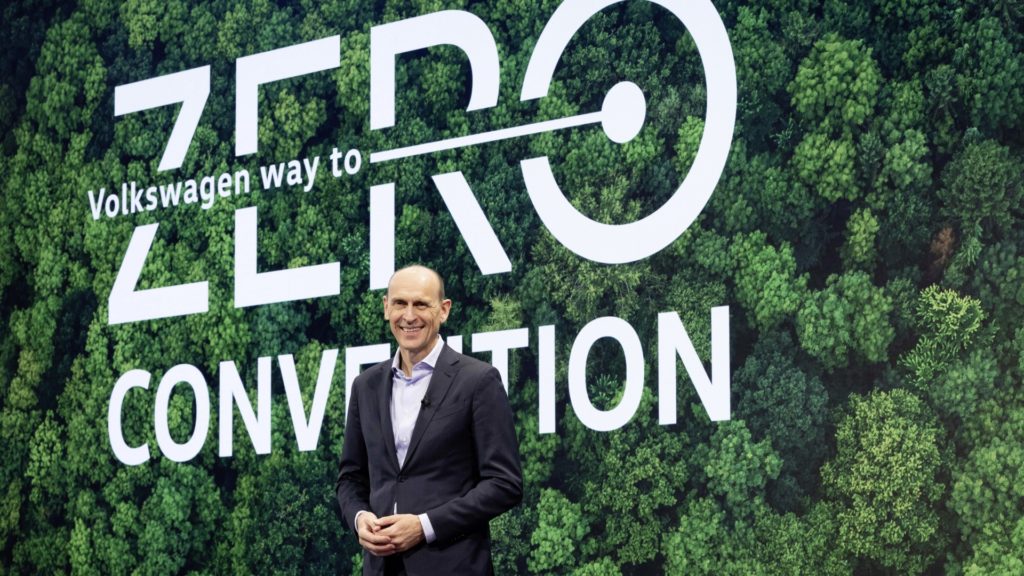
Way to Zero: roadmap van Volkswagen voor klimaatneutrale mobiliteit
Leusden, 29 april 2021
-
Volkswagen CEO Ralf Brandstätter at the Way to Zero Convention
Uitgebreid pakket maatregelen gericht op versnelling duurzame productie en gebruik vanelektrische auto’s, investeringen van 14 miljard tegen 2025
- Streven om CO2-uitstoot in Europa tegen 2030 met gemiddeld 17 ton per auto te verlagen, zo’n 40 procent minder dan in 2018
- Groene stroom: Volkswagen eerste autofabrikant die forse uitbreiding van windmolenparken en zonne-energiecentrales in Europa ondersteunt
- Duurzame productie: fabrieken in Europa en Amerika tegen 2030 overgeschakeld op hernieuwbare energiebronnen
Volkswagen geeft vandaag tijdens de eerste Way to Zero-conventie details vrij over de plannen om uiterlijk in 2050 netto CO2-neutraal te zijn. Een nieuwe tussentijdse mijlpaal is de beoogde vermindering van de CO2-uitstoot per auto in Europa tegen 2030 met 40 procent. Dit is aanzienlijk beter dan de eerdere doelstelling van de Groep van 30 procent (baseline: 2018). Als gevolg hiervan gaat een gemiddelde Volkswagen naar verwachting zo’n 17 ton minder CO2 uitstoten. Naast het versnellen van de transitie naar e-mobiliteit, wordt ook de productie, de toeleveringsketen en de exploitatie van elektrische auto’s netto CO2-neutraal gemaakt. Ook de systematische recycling van hoogspanningsaccu’s van oude elektrische auto’s staat hoog op de agenda.
“Volkswagen staat voor duurzame e-mobiliteit voor iedereen. Met ‘Way To Zero’ stellen we het milieu consequent centraal in al onze activiteiten”, aldus Ralf Brandstätter, CEO van Volkswagen. “Ons grote elektrische offensief is nog maar het begin. We gaan op een holistische manier om met decarbonisatie: van productie en gebruik tijdens de levensduur van een auto tot aan recycling. En we zijn de eerste autofabrikant die de inzet van hernieuwbare energiebronnen op industriële schaal gaat ondersteunen.”
Volkswagen ondersteunt de bouw van windmolenparken en zonnecentrales
Sleutelfactor bij het bereiken van CO2-neutrale e-mobiliteit is het consistent opladen van elektrische auto’s met groene stroom. Dit alleen al zou de CO2-uitstoot met bijna de helft verminderen in vergelijking met de standaard elektriciteitsmix binnen de EU. Volkswagen biedt zijn klanten vandaag al groene stroom aan via thuisladen of onderweg via de snellaadstations van IONITY. Het merk gaat nu nog een stap verder. Volkswagen is de eerste autofabrikant die rechtstreeks, en op grote schaal, de uitbreiding van hernieuwbare energie ondersteunt. Met deze support kunnen tegen 2025 in verschillende Europese regio’s nieuwe windmolenparken en zonnecentrales worden gebouwd.
Volkswagen heeft al met energiebedrijf RWE contracten afgesloten voor de eerste projecten. In Duitsland ondersteunt Volkswagen de bouw van een zonnecentrale met een totale capaciteit van 170 miljoen kilowattuur per jaar. De bijbehorende energiecentrale wordt zonder enige overheidssubsidie gebouwd in Tramm-Göthen, Duitsland. Met ongeveer 420.000 zonnepanelen wordt dit het grootste onafhankelijke project in Duitsland.
Het is de bedoeling dat alle projecten samen tegen 2025 ongeveer zeven terawattuur extra groene stroom kunnen opwekken. De hoeveelheid hernieuwbare elektriciteit die aan het net zal worden geleverd, groeit parallel met het aantal rondrijdende ID.-modellen. Op deze manier verbetert Volkswagen de footprint van de ID. Family en wordt de basis gelegd voor netto CO2-neutrale mobiliteit.
Groene productie en duurzame toeleveringsketen
Volkswagen zorgt er niet alleen voor dat de elektrische modellen op groene stroom kunnen rijden, maar werkt ook aan het koolstofarm maken van zowel de productie als de toeleveringsketen. Nu al is de elektriciteit die op alle Europese productielocaties wordt gebruikt, afkomstig van hernieuwbare bronnen. De fabriek in Zwickau, waar onder meer de ID.3 wordt gebouwd, was de pionier. Vanaf 2030 moeten alle fabrieken wereldwijd, behalve in China, volledig op groene stroom draaien. In de toekomst worden de grootste uitstoters van CO2 in de toeleveringsketen systematisch aangepakt. Het rolmodel hiervoor is de batterijcelproductie voor de ID.31 en ID.42, die nu al volledig op groene stroom draait.
Volkswagen schakelt nog dit jaar over op andere duurzame componenten die worden toegepast in de modellen van de ID. Family. Voorbeelden zijn batterijbehuizingen, velgen van groen aluminium en emissiearme banden. Er zijn meer dan tien focuscomponenten waarmee de ecologische voetafdruk van de ID. Family kan worden verkleind met zo’n twee ton per auto in de komende jaren. Bij nieuwe voertuigprojecten gaat Volkswagen van CO2-uitstoot een belangrijk criterium maken bij het gunnen van contracten aan leveranciers. Dit geldt ook voor de interne toeleveranciers zoals Volkswagen Group Components. Zo worden de tijdens de Power Day aangekondigde gigafabrieken voor batterijcelproductie volledig van groene stroom voorzien.
Het systematisch recyclen van batterijen, waarmee in de toekomst meer dan 90 procent van de grondstoffen kan worden hergebruikt, gaat een verdere bijdrage leveren aan het terugdringen van de CO2-uitstoot. De eerste recyclingfaciliteit van Volkswagen Group Components draait al in Salzgitter.
Versnelling van elektrisch offensief
Een belangrijk onderdeel van Way to Zero is de nieuwe ACCELERATE-strategie waarmee Volkswagen het elektrische offensief wil versnellen. Het doel is de volledige elektrificatie van het nieuwe wagenpark. Tegen 2030 zal ten minste 70 procent van alle verkochte Volkswagens in Europa volledig elektrisch zijn. De ambities liggen duidelijk hoger dan die van EU Green Deal. In Noord-Amerika en China moet het aandeel van elektrische auto’s in de verkoopmix tegen die tijd minimaal 50 procent zijn. Volkswagen brengt elk jaar minstens één nieuwe elektrische auto op de markt.
Bronvermelding / foto’s: Volkswagen NL
————————————————————————————————————–
ENGLISH VERSION
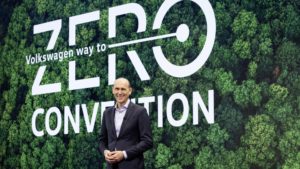
Volkswagen CEO Ralf Brandstätter at the Way to Zero Convention
At the first Way to Zero Convention, Volkswagen today gave details of its plans for decarbonizing the company and its products. The company intends to be net carbon neutral by 2050 at the latest. A new interim milestone is the targeted 40-percent reduction in CO2 emissions per vehicle in Europe by 2030 – substantially outperforming the Group target of 30 percent (baseline: 2018). As a result, an average Volkswagen would emit around 17 tons less carbon dioxide. As well as accelerating the transition to e-mobility, the production (including supply chain) and operation of electric cars is to be made net carbon neutral. Added to this is the systematic recycling of the high-voltage batteries from old electric vehicles.
“Volkswagen stands for sustainable e-mobility for all. We’ve set out on the ‘Way To Zero’ and are consistently placing the environment at the focus of all our activities,” said Ralf Brandstätter, CEO of Volkswagen. “Our big electric offensive was just the start. We’re taking a holistic approach to decarbonization: from production through service life to recycling. And we’re the first car maker to support the expansion of renewable energies on an industrial scale.”
Volkswagen supports the construction of wind farms and solar plants
A key factor in achieving carbon-neutral e-mobility is to be able to charge vehicles consistently with electricity generated entirely from renewable sources. This alone would reduce CO2 emissions by almost half compared with the standard EU electricity mix. Already today, Volkswagen offers its customers green electricity for charging at home (Volkswagen Naturstrom) and on the road (e.g. at IONITY charging stations). The company is now going one step further. Volkswagen is the first car maker to directly support the expansion of renewable energy on a large scale. As a result, new wind farms and solar plants are to be constructed in several regions of Europe by 2025.
Contracts for the first projects have already been signed with energy company RWE. In Germany, Volkswagen is supporting the construction of a solar plant with a total capacity of 170 million kilowatt hours each year. The associated plant will be completed in Tramm-Göthen in northeastern Germany by the end of 2021 and is being constructed without any state subsidies at all. Incorporating around 420,000 solar modules, it is the largest independent solar project in Germany.
It is planned that all projects together will generate around seven terawatt hours of additional green electricity by 2025. The amount of renewable electricity going into the grid will grow in parallel with the number of ID. vehicles. In this way, Volkswagen is improving the climate footprint of the ID. family and creating the basis for the net carbon neutral use of its electric fleet.
Green production and supply chain
As well as ensuring the green use of its vehicles, Volkswagen is also working to decarbonize both production and supply chain. Already today, the electricity used at all our European production sites comes from renewable sources. The pioneer here is the electric car factory in Zwickau, where the ID. family is produced. From 2030, all plants worldwide, other than in China, are to operate entirely on green electricity. In the future, the largest contributors to CO2 emissions in the supply chain will be systematically identified and reduced. The role model for this is the battery cell production for the ID.31 and ID.42, which already uses green electricity only and therefore has a substantially improved carbon footprint.
This year already, Volkswagen will be switching to other sustainable components in its ID. vehicles, including battery housings and wheel rims made from green aluminum and tires from low-emission production. There are more than ten focus components which will enable us to improve the carbon footprint of the ID. family by around two tons per vehicle in the years ahead. When it comes to new vehicle projects, Volkswagen will be making CO2 emissions a key criterion in awarding contracts to suppliers. In this way, the company intends to work with its suppliers to gradually improve their carbon footprint and ensure the sustainability of its supply chain. The company is also pursuing a clear decarbonization strategy in the in-house production of components at Volkswagen Group Components. As such the giga-factories for battery cell production announced during Power Day are to be supplied with entirely green electricity.
The systematic recycling of batteries, which will allow more than 90 percent of raw materials to be reused in the future, is intended to make a further contribution to reducing CO2 emissions. The goal is a closed loop for the battery and its raw materials that the company has at its own disposal across the Group. Volkswagen Group Components is already operating an initial recycling facility in Salzgitter.
Accelerating the electric offensive
At the heart of the Way to Zero is Volkswagen’s new ACCELERATE strategy aimed at stepping up the pace of the electric offensive. The goal is the full electrification of the new vehicle fleet. By 2030, at least 70 percent of all Volkswagen’s unit sales in Europe will be all-electric vehicles – that’s substantially more than one million vehicles. This would mean that Volkswagen would significantly outperform the requirements of the EU Green Deal. In North America and China, the share of electric vehicles in sales should be at least 50 percent. In addition, Volkswagen will be launching at least one new electric car each year. One day before the Convention, Volkswagen presented the ID.4 GTX3, the next model in the all-electric ID. family.
Way to Zero Convention for an open dialog with government, industry and society
“The ‘Way to Zero’ is our roadmap for effective climate protection, with clear and ambitious milestones. We live up to our responsibility for the environment. The ‘Way to Zero’ will provide us with a real competitive advantage. In the future, employees, customers and investors will give preference to those companies which place their social and environmental responsibility at the heart of their business. Sustainability will thus become a crucial factor in corporate success,” said Ralf Brandstätter. “However, Volkswagen cannot shoulder the decarbonization of mobility on its own. Government, industry and society need to come together to develop good ideas and make courageous investments.”
With the Way to Zero Convention, Volkswagen aims to foster an open dialog with government, industry and society. The day-long event, which was entirely digital due to the coronavirus pandemic, was attended by more than 20 speakers from political parties, NGOs, scientific institutions and other companies alongside representatives of Volkswagen.
You can find further information and media materials related to Way to Zero Convention at convention.vw-newsroom.com.
Source and pictures : Volkswagen Newsroom

